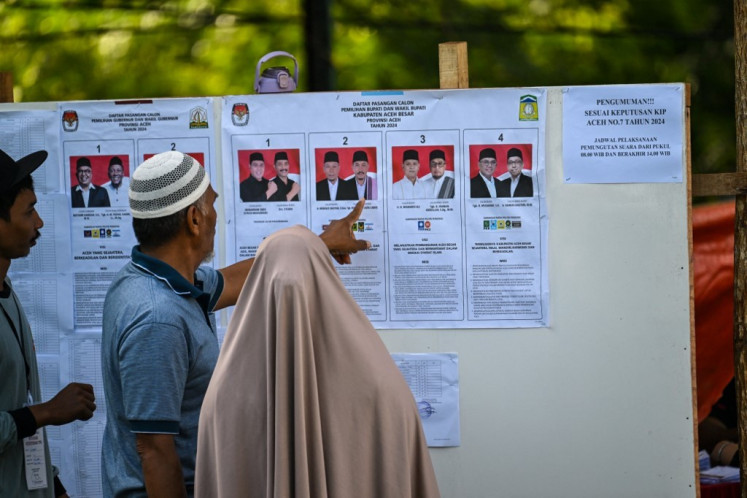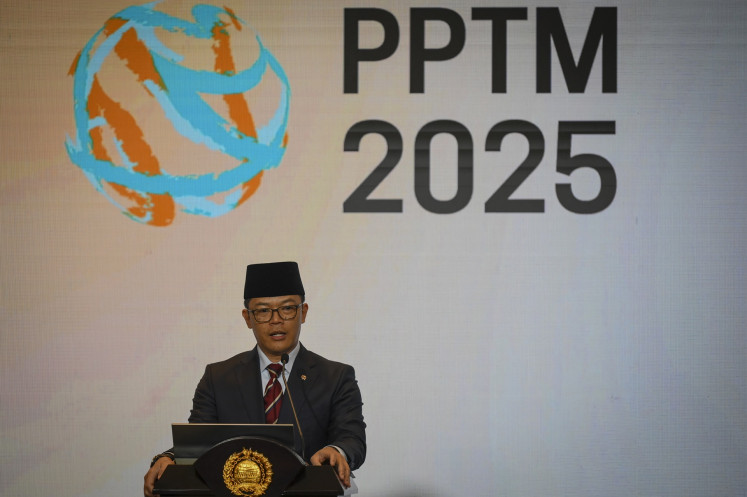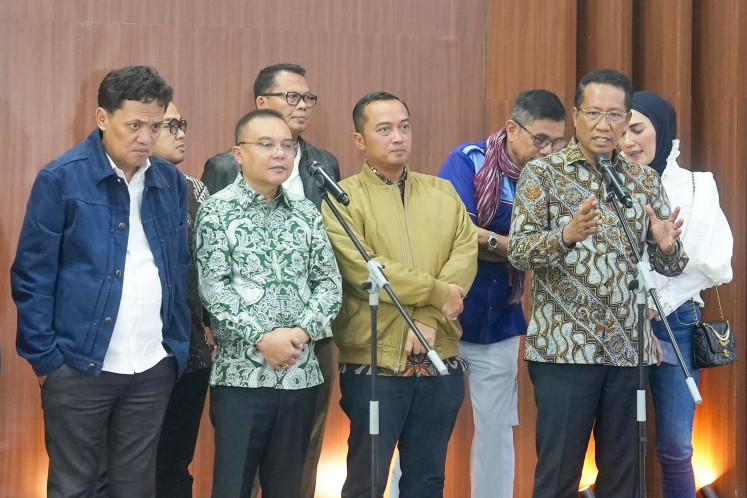Popular Reads
Top Results
Can't find what you're looking for?
View all search resultsPopular Reads
Top Results
Can't find what you're looking for?
View all search resultsAnalysis: Consumer durables confirm durability
At the time of writing, the Greek crisis remains unresolved
Change text size
Gift Premium Articles
to Anyone
A
t the time of writing, the Greek crisis remains unresolved. Europe remains in an icy freeze, in more ways than one. The fate of the euro remains in the balance and talk of its unravelling is picking up steam. Some of us will be reminded of the graphic images that recorded Indonesia’s veritable surrender to the US$23 billion IMF aid package.
Fifteen years later, this country’s economic fortunes continue to point upwards with amazing consistency. The broader picture is like a shifting kaleidoscope. The West is sliding south, the East is heading north. These shifting fortunes are creating a whole new set of tensions as the world grapples with the sunrise of a new world order. Economic power is being flexed in the realms of military power, with unusual vitriol being expressed at the Security Council of the United Nations. Russia and China have vetoed what they believe is yet another attempt at regime change by the Western powers, this time in Syria. India stands firmly within the Eastern bloc, unwilling to allow the creation of a new architecture that suits the NATO allies in the oil-rich Middle East. The impasse we are witnessing now is going to be repeated more often on the world stage. We can expect Brazil and much of Latin America, as well as South Africa and much of Africa to join forces. Gently but firmly, Indonesia too is making its voice heard. Game on. The political leaders in the developing world seem increasingly comfortable in their new garb, their collective weight.
Ironically, the captains of industry in the East have yet to wear that same confidence. They seem unwilling to cut the psychological ties with the West. At this moment, mainstream media from all corners of the globe are talking up the storm that will apparently consume the world if Greece collapses and the euro cracks. I find the prognosis unintelligent, arrogant and belittling. It pays scant respect to the new power, the new confidence of almost two-thirds of the human race. There’s no denying that almost half the population in these emerging markets still live in poverty. Problem, or opportunity? Today, in these changing circumstances, the answer to the old question is dazzlingly clear. Finally, there is a glimmer of hope for the teeming millions not because of a sudden change of heart, but because they represent endless economic opportunity. Civic protests raging around the world are making
politicians rethink their survival at the ballot. Business leaders are seeing the voracious appetite for products and services in the developing markets.
Western capital is heading West to shore up dwindling reserves. The impending credit squeeze is being touted as the precursor to a global recession. This time, business leaders who understand the growing potential of the developing markets need to ignore the old pundits and their old mantras. Private equity has not disappeared, it is running to safer havens like gold. For multinational corporations and local entrepreneurs alike, good prospects and good ideas will always attract investment. If political leaders in the East recognise the lessons of the Arab Spring, they will focus their attention on the two biggest impediments to their economies: corruption and population. If the
stolen wealth in poor countries were redeployed to employment and education, everybody would stand to gain.
In Indonesia, the single biggest economic restraint today is indeed corruption. Arresting endemic corruption is Job No.1 for the country’s elite. The battle against that evil will help accelerate the remarkable progress that is being made today, despite the odds.
The consumer durables industry, one among many, has seen explosive growth in recent years. This is true across the board, both white goods and brown. The numbers are amazing, by any standard. The penetration of refrigerators has moved steadily up, starting with 36 percent of homes to 50 perecnt at the end of 2011. In the last 15 months, another 10 percent of homes became proud owners of a refrigerator. Similar stories abound, across almost every product categorty. In just five years, the number of homes with a washing machine has moved up from 9 to 18 percent. During the same timeframe, computers and laptops climbed from only 4 to 13 percent of homes. The only decline is in the old business of compact systems, the ghetto-blaster giving way to the digital age.
LG is not the only company for whom life’s good, and getting better. Most importantly, demand for purchases planned in the next 12 months remain robust. Hand in glove, the financial services industry is gaining from the consumer’s appetite for more amenities in the home. More on that industry, next week.
All of this growth transpired while the pundits have been crying economic armageddon. Many continue, regardless of the facts. The fiction is becoming increasingly transparent, the prohecies are being denied. In a country like Indonesia, the era of economic stability has finally dawned. It is the consumer, the people, who are helping to make the wheels of their domestic economy turn, harder and faster.
The conclusions are based on Roy Morgan Single Source, the country’s largest syndicated More than 25,000 respondents are interviewed every year, week after week. The data is projected to reflect 87 percent of the population 14 years of age and over.
The writer can be contacted at debnath.guharoy@roymorgan.com










